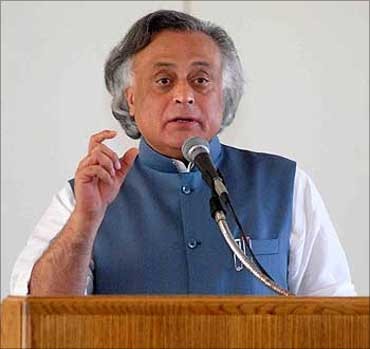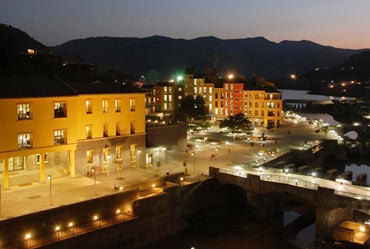Arijit Barman in Mumbai

"The Goldilocks view of India is over," said an FII Indophile from Wall Street on business TV, unwinding his 'long only' positions in the Indian equity markets.
Usually, one watches market news on TV on mute, but the snappy byte had a resonance to it.
From environmental clearance to regulatory approval, from land acquisition for greenfield projects to displacement of tribals, it's been a season of scams, deep mistrust and hostility among companies, bureaucrats, regulators and politicians.
...
How the fault lines between politics and business grew sharper in 2010
Photographs: Mukesh Gupta/Reuters

Instead of the twin hubs of politics and business working in tandem to sustain the nine per cent growth momentum, the fault lines between the two are only getting sharper.
Delhi seems to have waged a war against Mumbai and the latter is fighting back.
It certainly is getting belligerent. If it's Anil Agarwal vs Rahul Gandhi, then it's Cairn vs petroleum ministry and ONGC.
If it's Sahara vs Sebi, it's Ajit Gulabchand vs Jairam Ramesh. "What we are seeing is an 'us versus them' battle, reminiscent of V P Singh days," says Suhel Seth, Managing Partner of Counselage.
...
How the fault lines between politics and business grew sharper in 2010
Photographs: Dominic Xavier/Rediff.com

Ratan Tata's now infamous Banana Republic quip seems just a teaser. Sample the following:
"Certain individuals occupying their office act with malice and biased approach which serve no public good . Unfortunately, some officers bear grudges against Sahara India Parivar, repeatedly for not fulfilling their vested legal demands," screamed full page advertisements from Sahara across national dailies "responding to Sebi's imprudent and inappropriate ex-parte order," after the market regulator barred the group from raising money from public for its real estate IPO.
...
How the fault lines between politics and business grew sharper in 2010
Image: Union Environment Minister Jairam Ramesh
Here's another: "Every public authority must exercise its powers so as not to hurt the citizens' rights The timing of your showcause notice also speaks volumes about your motives" - a scathing personal attack on environment minister Jairam Ramesh by Lavasa's lawyers after the ministry blocked HCC's flagship project off Mumbai, again just ahead of its Rs 2,000 crore IPO.
In both the cases, the matter is in court. And, you thought India Inc was afraid to sue!
What's more worrying across corporate India is that the Centre is shifting goalposts midway or is attacking the basic federal structure by overriding approvals given by states. And, that is affecting projects on ground.
...
How the fault lines between politics and business grew sharper in 2010
Image: Lavasa projectPhotographs: Courtesy: Lavasa website
From power to cement, from steel to construction, mining and infrastructure.
"Take up an issue immediately, not after two years when money has already been pumped in. If you have to stop a project midway, the impact can be backbreaking. Lavasa has been going on for quite a while now," says Godrej Group Chairman Adi Godrej.
The sentiment is unanimous: You cannot have policies that are open to interpretation and then midway there is a course correction.
"All of us want sustainable growth, clean environment. But some of the environmental policies have indeed disturbed some of us, and, I believe, also some within the government. Even for land rehabilitation, we recognise the sensitivity of the subject. Proper compensation and some stake in the proposed venture is a must for those whose lands are acquired. But, environment policies should not be obstructionist in nature," argues Bajaj Auto Chairman Rahul Bajaj.
How the fault lines between politics and business grew sharper in 2010

How can states like Orissa prosper if they cannot harness their natural resources, ask corporate captains.
"What Jairam Ramesh has to understand is that many of these projects were cleared by his predecessors and, in many cases, they were cleared by the collective decision of a Cabinet. It's a lose-lose for all.
For political brownie points, we cannot be sacrificing economic prosperity. Politicians and industry should co-opt instead of confront," says the CEO of a Mumbai-based industrial house, whose projects are awaiting government sanction.
...
How the fault lines between politics and business grew sharper in 2010
Photographs: Reuters

If that was not enough, what is causing more confusion is that the government, too, seems divided in thought and action.
Cabinet ministers openly express their disapproval in public, instead of taking joint decisions.
"Kamal Nath attacks Montek. Montek has reservations against Ramesh's no-go policies. The power ministry doesn't see eye to eye with Paryavaran Bhavan. It's a circus out there. And, after that, we are seeking FDI? If Posco and Mittals cannot set up a plant despite pumping billions, you think anyone will buy into the India story anymore," asks corporate planning head of one of India's bulge-bracket conglomerates.
...
How the fault lines between politics and business grew sharper in 2010
Photographs: Reuters

"In the past, the PM has had great rapport with industry. He handpicked the best CEOs to head the Investment Commission, but nothing came of their suggestions. He held on to pressures to introduce caste-based reservations or reprimanded his Cabinet colleagues when they made insensitive statements. But, he's woefully quiet now," feels a veteran Delhi-based industrialist, who also headed apex industry bodies in the past.
In such a time of apparent 'crisis', it's the role of the three key chambers - CII, Ficci and Assocham - to play catalyst and bridge, is also being questioned.
It's time for some soul searching, as many in private conversations will argue, their role - both to influence and for access - is at its nadir.
The government's representation at the CII-India Economic Summit has dwindled over the years and, this year, it was glaring.
...
How the fault lines between politics and business grew sharper in 2010

Even at the World Economic Forum in Davos in 2011, despite the India theme, very few Cabinet ministers are expected to visit.
"Industry chambers should also reinvent and sensitise themselves to these new realities. CII has become India's largest event management company," quips Counselage's Seth.
The impact is ominous. FDI inflows into the country in the April-June quarter of this financial year have halved to $3.15 billion, compared to the same period last year.
"It's important for India to send the right message on FDI. Whereever I go, people ask why is the Cairn transaction getting delayed," says Anil Agarwal, besieged by opposition from policy makers, who have stopped his mega bauxite mining and aluminium project in Orissa and are also dragging feet on his $9.6-billion buy of Cairn India.
...
How the fault lines between politics and business grew sharper in 2010
Photographs: Uttam Ghosh/Rediff.com

"The credibility of the entire system will take a beating in this environment. And, it could affect investment," laments S Gopalakrishnan, co-founder, CEO & MD, Infosys.
It was clearly a test of patience for the usually jovial Sashi Ruia, managing director of Essar Group, when he recently drew the India-China parallel and said: "To close the gap, the government needs to get out of the way."
China produced 567 million tonnes of steel last year, India clocked 56 million tonnes. You get the picture.
So, will all this then trigger an investment exodus?
Tatas today rely on 60 per cent of their turnover from abroad and from the Mahindras to Bharti, from Reliance Industries to Aditya Birla Group and Essar, the global play is as strategic as it is essential.
...
How the fault lines between politics and business grew sharper in 2010
Photographs: Ajay Verma/Reuters

Reliance alone is planning to spend over $10 billion in America. If the trend persists in certain sectors, including metals and manufacturing, the flight of capital will aggravate.
"I can see an elevated level of uncertainty on the faces of many industrialists," admits Axis Bank MD & CEO Sikha Sharma.
But, is the gloom overbearing? Contrarian voices do exist. "The India story is and will be strong," argues Godrej.
According to a recently-retired veteran industry voice, who did not want to be identified: "There is a new ballgame in town (read Jairam Ramesh) and its causing pain. For the first time, we have an environment minister who is taking his job seriously. But, remember he has been mandated to do that. I know and am convinced that there is no hostility between the government and industry. Industry also has to realise that it has taken people for a ride for long. So, it should also do some introspection... I genuinely believe that what he is doing will be beneficial in the long term."
The clock's ticking on that one.
(With inputs from Bibhu Ranjan Mishra in Bangalore)













article